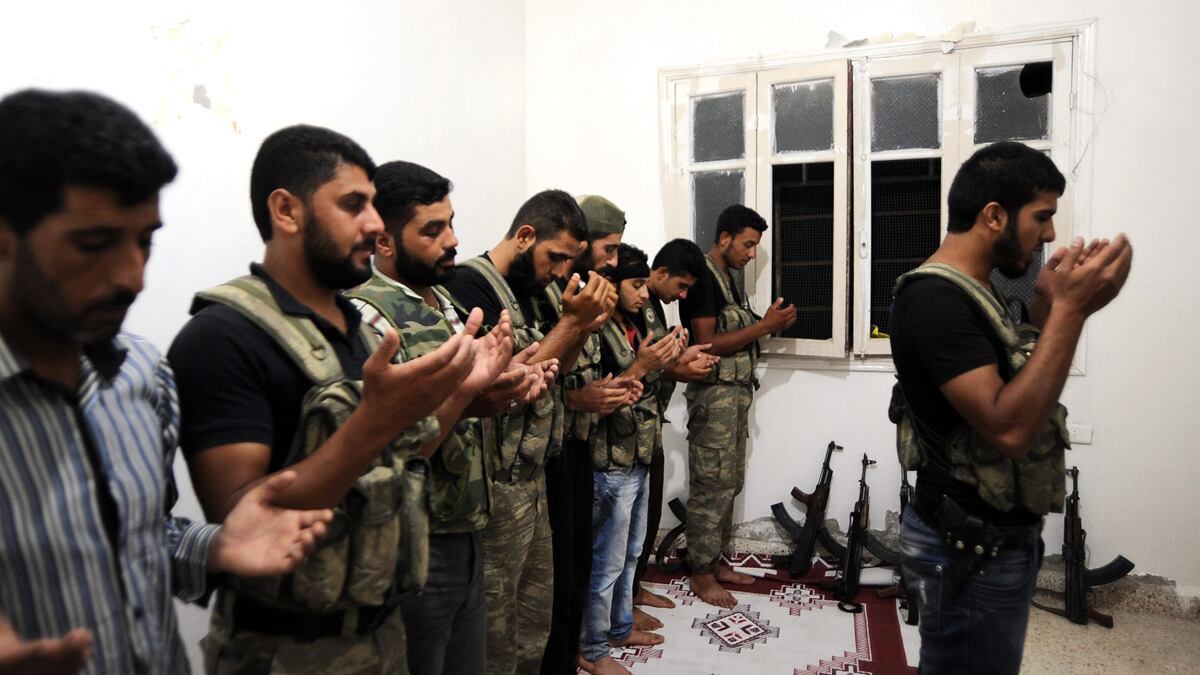While the international media focus on whether al Qaeda has latched onto the escalating Syrian conflict, opposition activists and human-rights observers are less alarmed than the Pentagon about the trickle of foreign fighters arriving in the war-torn country than about the home-grown hardening of sectarian attitudes among Syrians and the adoption by rebels of more muscular Islamist views.

They worry that the prolonged strife and blood-letting is disfiguring the rebellion, turning what started out as a more secular effort to oust President Bashar al-Assad and his minority Alawite-led government into a sectarian confrontation between Sunnis and religious minorities that could render Syria so fractured it is ungovernable as a single state.
“The conflict has become more sectarian and more Islamic,” says Ole Solvang of Human Rights Watch. “It was a lot more secular a year ago.” He says he’s noticed in the last 12 months more fighters sporting beards and more wearing headbands proclaiming, “There Is no God but God, and Mohammed Is His Messenger.” Fighters are becoming radicalized and talking openly of the rebellion ushering in an Islamist state based on Sharia. When asked whether they are fighting for democracy or Islam many are now emphasizing the latter.
Above all, hatred for Assad’s minority Alawite sect, an offshoot of Shiite Islam that some Sunnis reject as not being Islamic at all, is growing, adding to a toxic mix of Islamism and sectarianism that’s already leaching poison beyond Syria’s borders into neighboring Lebanon. On Aug. 15, gunmen from a Lebanese Shia clan abducted more than 20 Syrian Sunnis in the Bekaa Valley in eastern Lebanon in response to the kidnapping of a man by rebels in the Syrian capital of Damascus. And earlier this week, a dozen were killed and scores more injured when fighting erupted in the Lebanese city of Tripoli, involving the Alawites and Sunni Muslims.
Radwan Abu-Alsha, a commander with the Tawheed brigade in Aleppo, is not unusual in brusquely rejecting the notion that there can ever be reconciliation between Sunni rebels and Alawites, whom he says butchered his wife and children last March in Homs. “Alawites were my friends and neighbors, but no one should ask me to live side by side with them again,” he told The Daily Beast. Along with several Tawheed colleagues who nodded vigorously in agreement, he stressed the responsibility of the Alawites in the pro-Assad Shabiha militia for many of the worst excesses in Homs this winter and spring and elsewhere in the country.
Many Sunnis have worked closely with the regime since Hafez al-Assad established it 40 years ago. Sunnis who have benefited from it in terms of power and wealth continue to fight to preserve it. But the 18 month-long conflict is exacerbating Syria’s sectarian divisions, testing the loyalty of senior Sunni members to breaking point and prompting an increasing number to defect.
Last week, the most senior defector since the uprising against the government began, Riad Hijab, the country’s former prime minister, urged Syrian troops and officials to join the rebellion, labeling Assad the “enemy of God.” Some Syrians interpreted this as a coded message suggesting that, as an Alawite, Assad is not a true Muslim.
On Aug. 19, Assad appeared to respond to the charge by making a rare public appearance to pray at the Hamad mosque in Damascus at the start of Eid al-Fitr, a three-day holiday marking the end of the holy month of Ramadan. It was the first time he’d been seen in public since July’s bombing in Damascus in which top security and defense aides were killed.
Like his father Hafez al-Assad, Bashar has sought to obscure the regime’s Alawite roots, but he appears to be hedging his bets now, praying at a Sunni mosque one day but using the Alawite-dominated Shabiha to raise the sectarian temperature by carrying out atrocities such as the massacre in May in Houla in which 108 Sunnis died. Syria observers believe this is part of a last-ditch effort by the regime to divert the conflict into a sectarian war and to make it less about Assad. And it appears to be working.
“In order to survive, Assad and his Alawite generals will struggle to turn Syria into Lebanon—a fractured nation, where no one community can rule,” argues Syria expert Joshua Landis of the University of Oklahoma on his blog, Syria Comment. He terms this Assad’s Lebanon option.
The Assad regime is stoking fear among the country’s minorities, from Assad’s Alawite sect—15 percent of Syria’s 22.5 million population—to Christians and Druze, that a rebel victory will trigger Sunni triumphalism and unleash a religious cleansing.
And some increasingly Islamist rebel forces are falling into Assad’s trap, forcing out Christians from their homes in Homs and other towns, including 9,000 Christians from the western Syrian city of Qusayr, following an ultimatum by a local rebel commander. Christian refugees from the Syrian town of Kusair claim that radical Islamists who had joined the fight against the Assad regime have murdered many of their relatives.
Gregorios III Laham, the Melkite Greek Catholic Patriarch of Damascus, says it isn’t foreign jihadists who are doing this. Talking to Sky News, he said they were local Muslims “moving into peaceful Christian areas.” He said he fears Christians could be forced out of the country after the civil war, as happened in neighboring Iraq after the fall of Saddam Hussein, where 600,000 fled, many going to Syria.
In an interview with The Daily Beast, two senior Sunni mosque leaders in the rebel-held town of Al Bab insisted post-Assad Syria should be run according to Sharia law, but that minorities should not be afraid. “Islamic law accepts other religions. The majority of Syrians are Sunni Muslims and so they want Sharia law,” says Abdulbaset Kuredy. “We only fight people who carry weapons and those who don’t, have nothing to fear.”
He says, though, that Alawites are not Muslims, as they don’t apply “our teachings.” Is he afraid that the civil war will become more sectarian? “Hundreds of years ago we lived next door to each other and in peace. Assad is exploiting sectarian divisions,” he says.
Opposition activist “Tony” al-Taieb, who works with the Free Syrian Army-linked military council in Aleppo, says it is not surprising that religion is playing a more prominent role and that sectarian feelings are growing. “People are suffering and experiencing terrible things and it is natural for attitudes to harden as this goes on,” he says. He blames Western nations partly for the increasing sectarianism, arguing that the rebels feel neglected by the U.S. and European nations, which should be doing more actively to help rebels finish Assad. “There are more risks for the West from hanging back than intervening,” he adds.
Among the troubling risks is that as sectarianism increases, more foreign fighters and jihadists will be attracted to Syria, further distorting what started as a reform movement into a holy war. Observers on the ground—from journalists to human-rights groups—have seen only small groups of foreign fighters, some possibly linked to al Qaeda. But as the conflict becomes prolonged, the numbers are likely to grow.






